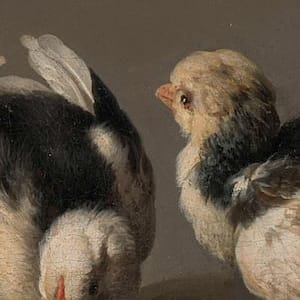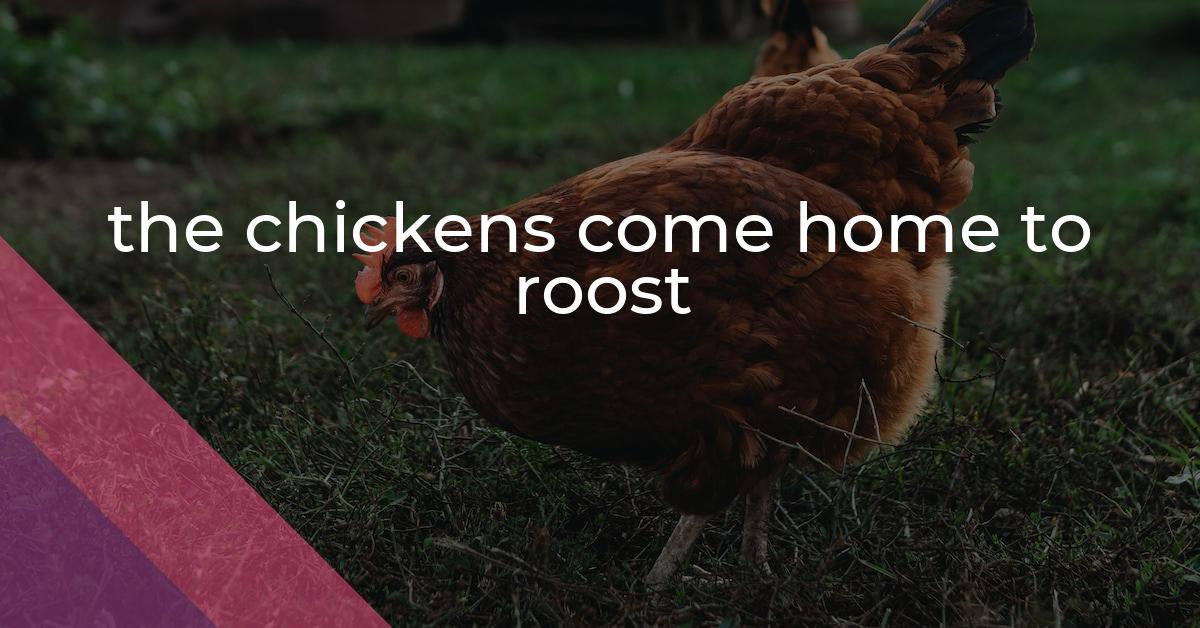the chickens come home to roost: Idiom Meaning and Origin
What does ‘the chickens come home to roost’ mean?
The idiom "the chickens come home to roost" means that negative consequences or troubles from previous actions will eventually catch up to a person.

Idiom Explorer
The idiom *the feathers fly* means a situation where there is a lot of noise, conflict, or commotion, usually resulting in a heated argument or fight.
The idiom "the cat's out of the bag" means that a secret or hidden information has been revealed or made known to everyone, often causing surprise or a negative outcome.
The idiom "teach someone a lesson" means to make someone experience an unpleasant consequence in order to discipline or show them the negative consequences of their actions.
The idiom "taste of one's own poison" means to experience the negative consequences of one's own harmful actions or words.
The idiom "taste of one's own medicine" means to experience the same negative treatment or consequences that one has given to others.
The idiom "take its toll" means that something has a negative impact or effect on someone or something, usually resulting in damage, exhaustion, or loss. It implies that there are consequences or consequences to be paid for a particular action or situation.
The idiom "take a turn for the worse" means that a situation or someone's condition has deteriorated or become more negative than before.
The idiom "sow dragon's teeth" means to do something that will result in conflict or trouble in the future, often as a result of taking revenge or seeking justice.
The idiom "snitches get stitches" implies that those who betray or inform on others will face retaliation or punishment for their actions.
Unveiling Circled Misfortune
The idiom "the chickens come home to roost" carries a metaphorical meaning, signifying the repercussions of one's actions eventually catching up to them. This idiom can be traced back to various historical and literary references, showcasing its prevalence and longevity in the English language.
One notable source suggests that the idiom can be traced back to biblical phrases and is strengthened by its inclusion in the writings of William Shakespeare. The phrase "roost" specifically refers to a bird's resting place, symbolizing the consequences that eventually catch up with a person, much like chickens returning to their roosting place at the end of the day.
One of the earliest known references to the idiom appears in Geoffrey Chaucer's "Canterbury Tales," written in the late 14th century. Chaucer used a similar phrase, "Home to roost then cometh all thy bale," which conveys a sense of inevitable misfortune following one's actions. This provides further evidence of the idiom's existence and usage during this era.
The phrase gained prominence in the mid-19th century when it was mentioned in an article written by The Times, a British newspaper, on December 11, 1855. The article stated, "Evil deeds, like chickens, come home to roost." This publication is often cited as the initial documentation of the precise idiom that we know today.
The idiom's meaning is straightforward and can be comprehended by most English speakers. It conveys the idea that the consequences of one's actions will inevitably catch up with them, often suggesting a certain poetic justice. It serves as a reminder that our actions have repercussions, and we must be mindful of the choices we make.
Various examples of this idiom can be found in literature, media, and everyday conversations. For instance, one might say, "After years of mistreating her employees, she was finally held accountable when her company went bankrupt. The chickens came home to roost." This example illustrates the concept of the idiom in recognizing the correlation between someone's poor treatment of others and the negative outcome they eventually faced.
The idiom "reap what one sows" shares a similar meaning with "the chickens come home to roost." Both idioms highlight the idea that our actions have consequences, and we will eventually experience the results of our choices.
While "the chickens come home to roost" emphasizes the inevitability of facing the consequences, "reap what one sows" focuses more on the idea of receiving the outcomes that align with the actions taken. They both serve as reminders to consider the potential repercussions before acting.
When we examine these idioms, we can see the interconnectedness between them. The chickens coming home to roost illustrates how the consequences of our actions catch up to us, while reaping what one sows emphasizes the idea of receiving the outcomes that align with the choices made.
By understanding these idioms and their meanings, we can navigate our lives with greater awareness of the potential consequences of our actions. They remind us to be mindful of our choices, treating others with kindness and making decisions that align with our values.
As English speakers, we are fortunate to have these idioms as part of our language. They serve as valuable reminders of the interconnectedness between our actions and the results we experience. So, the next time you find yourself faced with a decision, remember the chickens and the seeds you sow, and choose wisely so that the outcomes are ones you can proudly reap.
Example usage
Examples of how the idiom "the chickens come home to roost" can be used in a sentence:
- After years of corruption, the politician finally got caught and went to jail. It seems like the chickens have come home to roost.
- He always took advantage of people's good nature, and now that he needs help, nobody is willing to lend a helping hand. Looks like the chickens are coming home to roost for him.
- The company ignored safety protocols for years, and now they are facing a major lawsuit after an accident. The chickens have finally come home to roost.
More "Consequences" idioms



